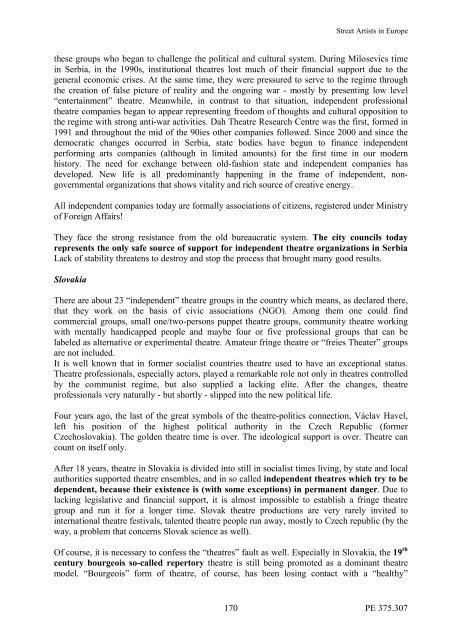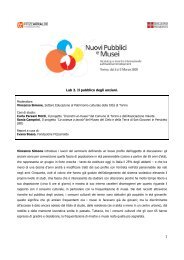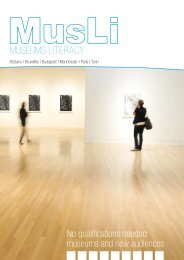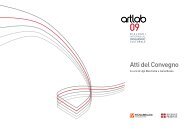STREET ARTISTS IN EUROPE - Fondazione Fitzcarraldo
STREET ARTISTS IN EUROPE - Fondazione Fitzcarraldo
STREET ARTISTS IN EUROPE - Fondazione Fitzcarraldo
You also want an ePaper? Increase the reach of your titles
YUMPU automatically turns print PDFs into web optimized ePapers that Google loves.
Street Artists in Europe<br />
these groups who began to challenge the political and cultural system. During Milosevics time<br />
in Serbia, in the 1990s, institutional theatres lost much of their financial support due to the<br />
general economic crises. At the same time, they were pressured to serve to the regime through<br />
the creation of false picture of reality and the ongoing war - mostly by presenting low level<br />
“entertainment” theatre. Meanwhile, in contrast to that situation, independent professional<br />
theatre companies began to appear representing freedom of thoughts and cultural opposition to<br />
the regime with strong anti-war activities. Dah Theatre Research Centre was the first, formed in<br />
1991 and throughout the mid of the 90ies other companies followed. Since 2000 and since the<br />
democratic changes occurred in Serbia, state bodies have begun to finance independent<br />
performing arts companies (although in limited amounts) for the first time in our modern<br />
history. The need for exchange between old-fashion state and independent companies has<br />
developed. New life is all predominantly happening in the frame of independent, nongovernmental<br />
organizations that shows vitality and rich source of creative energy.<br />
All independent companies today are formally associations of citizens, registered under Ministry<br />
of Foreign Affairs!<br />
They face the strong resistance from the old bureaucratic system. The city councils today<br />
represents the only safe source of support for independent theatre organizations in Serbia<br />
Lack of stability threatens to destroy and stop the process that brought many good results.<br />
Slovakia<br />
There are about 23 “independent” theatre groups in the country which means, as declared there,<br />
that they work on the basis of civic associations (NGO). Among them one could find<br />
commercial groups, small one/two-persons puppet theatre groups, community theatre working<br />
with mentally handicapped people and maybe four or five professional groups that can be<br />
labeled as alternative or experimental theatre. Amateur fringe theatre or “freies Theater” groups<br />
are not included.<br />
It is well known that in former socialist countries theatre used to have an exceptional status.<br />
Theatre professionals, especially actors, played a remarkable role not only in theatres controlled<br />
by the communist regime, but also supplied a lacking elite. After the changes, theatre<br />
professionals very naturally - but shortly - slipped into the new political life.<br />
Four years ago, the last of the great symbols of the theatre-politics connection, Václav Havel,<br />
left his position of the highest political authority in the Czech Republic (former<br />
Czechoslovakia). The golden theatre time is over. The ideological support is over. Theatre can<br />
count on itself only.<br />
After 18 years, theatre in Slovakia is divided into still in socialist times living, by state and local<br />
authorities supported theatre ensembles, and in so called independent theatres which try to be<br />
dependent, because their existence is (with some exceptions) in permanent danger. Due to<br />
lacking legislative and financial support, it is almost impossible to establish a fringe theatre<br />
group and run it for a longer time. Slovak theatre productions are very rarely invited to<br />
international theatre festivals, talented theatre people run away, mostly to Czech republic (by the<br />
way, a problem that concerns Slovak science as well).<br />
Of course, it is necessary to confess the “theatres” fault as well. Especially in Slovakia, the 19 th<br />
century bourgeois so-called repertory theatre is still being promoted as a dominant theatre<br />
model. “Bourgeois” form of theatre, of course, has been losing contact with a “healthy”<br />
170<br />
PE 375.307






